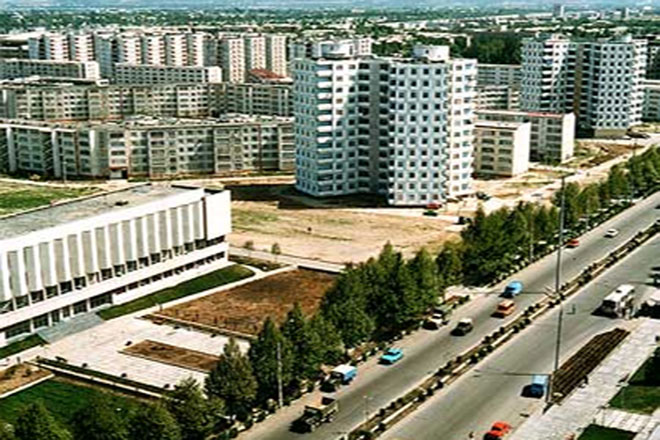Azerbaijan, Baku, Oct. 28 / Trend /
Tajikistan can play a major role as a key strategic partner for Europe and the West in Central Asia, MEP Struan Stevenson said.
Stevenson expressed this view in his letters to President Jerzy Buzek of the European Parliament and Prime Minister David Cameron of the United Kingdom, following his recent high-level visit to Tajikistan, the Tajik Embassy in Azerbaijan reported.
Struan Stevenson is Personal Representative of the President in Office of the OSCE (Kazakhstan) responsible for the Ecology & Environment of Central Asia. He is a Conservative Member of the European Parliament representing Scotland and President of the Intergroup on Climate Change, Biodiversity & Sustainable Development.
He traveled to Tajikistan in mid-September for meetings with the Minister for Foreign Affairs - Hamrokhon Zarifi and with Gul Sherali - Minister for Energy & Industry. I also met with the Speaker of the Majlis - Shukurjon Zuhurov, the Chairman of the Committee on Environmental protection - Khursandmurod Zikirov and the First Deputy Minister of Melioration & Water Resources - Sulton Rahimov. I also visited the impressive Nurek and Rogun Hydro Electric Power projects on the Vakhsh River.
Tajikistan has emerged after a bloody civil war following independence, to become a functioning democracy which is a model for the region. It has a good record on human rights and while it is still a relatively poor country, it has great potential to develop mineral and water resources, provided it can achieve significant levels of inward investment, the statement says.
Tajikistan's geographical position nestling in the high Pamir Mountains is on the rooftop of the world, with Afghanistan, Iran and the other Central Asian republics as neighbors that make it strategically important for the West. This is a highly sensitive area, he believes.
"War is still raging in neighbouring Afghanistan where the Taleban are continually active. Islamic terrorists lurk in the mountains in nearby Pakistan. Iran seeks to spread its ideological influence across the whole region. Drug trafficking is rife. But Tajikistan, under the firm leadership of President Emomali Rakhmon, stands guard. It is at the forefront of the fight against drugs and terrorists and as such, is a key strategic ally for the West," Stevenson said.
Tajikistan, he said, also has a major role to play in bringing stability to this volatile region. Through the exploitation of its massive water resources, Tajikistan will soon be able to meet all of its own energy requirements while at the same time exporting electricity to its neighbors. A 500 Kv transmission line is already under construction linking Tajikistan and Afghanistan. The provision of electricity to this war-torn state will be a positive contribution towards restoring peace and re-building Afghanistan's shattered economy.
"Of course water issues affecting the upstream and downstream nations in Central Asia are a source of constant tension and the proposed construction of the Rogun reservoir on the Vakhsh River has become a focus of controversy. When operational, Rogun will produce a massive 3600 MW at peak capacity. Over 45 miles of underground tunnels have already been completed during the Soviet era and 5000 workers are engaged day and night in the construction of giant underground halls where the turbines will be located. It is intended to dam the Vakhsh River in the steep narrow valley in which Rogun is located with a 335 metre high stone and clay embankment. I visited Rogun and was deeply impressed by what I saw," Stevenson noted.
The Uzbeks in particular are alarmed that this dam would be vulnerable to severe seismic activity and if ever breached, would have catastrophic consequences for downstream countries like Uzbekistan. German and Pakistani experts have been employed to assess the Rogun project by the World Bank. A final assessment will be made in 2011. "I am convinced, however, following my own visit to Tajikistan, that this project is both safe and regionally essential," he said.
Stevenson said ninety five percent of electricity in Tajikistan is generated from hydro electric power projects. The overhead lines and infrastructure needed to sell this electricity to neighbouring countries like Afghanistan and Pakistan are already being built. The new reservoirs being planned at Rogun will take ten years to complete before they are fully operational.
"The Tajiks guarantee that they will continue to supply their downstream neighbours with the same amount of water that they enjoy now via the Amu Darya and Syr Darya rivers. They claim that their new system of dams will provide a properly managed water source which will benefit everyone. The Tajiks point out that 60% of the rivers which serve Central Asia are sourced in Tajikistan. They claim that they have never and will never restrict water flow to their downstream neighbors," the stament says.
Once it is operational, Rogun will provide a source of green, environmentally friendly energy which is both cheap and plentiful and will meet the needs of Tajikistan while also providing essential energy for neighbouring countries like Afghanistan and Pakistan. It seems like a win-win situation in an area that is desperate for energy. Combined with a more strategic use of water in the downstream countries, with concrete-lined reservoirs and droplet irrigation, there is no reason why the abundant water resources of Central Asia cannot be distributed fairly and used in a way that enhances, rather than threatens the future of the Ferghana Valley.
Tajikistan is leading the way in water resource management in Central Asia, providing energy and water for its neighbours. It deserves the encouragement of the West in its endeavours, he noted.






